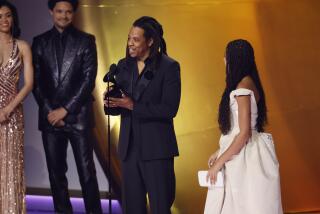Soul Train Awards Honor Black Stars
- Share via
Michael Jackson!
Bobby Brown!
Anita Baker!
Whitney Houston!
The third annual Soul Train Music Awards on Wednesday at the Shrine Auditorium featured virtually all the top stars in contemporary black music, as well as presenters such as Mike Tyson and Eddie Murphy--who bestowed yet another lifetime achievement award on Michael Jackson.
Unlike the Grammys, the show came in on time. Unlike the American Music Awards, there weren’t any victories by white pop star George Michael for the producers to explain, and Murphy behaved himself while sharing the mike with Jackson.
So why was Don Cornelius, the show’s co-executive producer, so low-key after the ceremonies?
Because he thinks that the show still isn’t getting a fair shake from the television industry.
“It seems that everything in television is viewed as black or white,” Cornelius said in an upstairs production office after the taping of the show, which was syndicated to 89 stations around the country, including Los Angeles’ KTTV Channel 11.
“And if a program seems black it doesn’t get honest and equal consideration on any level, whether you are talking about networks or syndication,” added the founder of the long-running “Soul Train” dance show.
“Just on the strength of Michael Jackson’s name, we should have had 30% more stations than we did last year, and we have 17 fewer stations.
“I don’t have an explanation for it. But it’s frustrating to bring in this kind of talent package and have it treated like it’s just another show that independent stations could get any day of the week.”
Cornelius acknowledged that having more white artists and presenters on the show might make it more “palatable” to a general audience, but he said that he doesn’t want to go that route. (The only non-black celebrities on the bill were Sheena Easton, who performed her pop/R&B; hit “The Lover in Me,” and presenters Elizabeth Taylor, Heather Locklear, Melissa Manchester, Paul Rodriguez and the members of the group Lisa Lisa & Cult Jam.)
“We’re not trying to do a gerrymandered black show that appeals to white people or compete with the so-called general market efforts,” he said, referring to the American Music Awards and the Grammys. “We’ve had to make a decision as to what we want to be in character, in style. And we want to be a show about black music. We don’t want to duplicate something that’s already being done. If you do that, who needs you?”
If the show, hosted by Dionne Warwick, Patti LaBelle and sportscaster Ahmad Rashad, still doesn’t get the respect it deserves from the TV industry, it does have the support of the black music industry.
Anita Baker, the top winner with three awards including song of the year for “Giving You the Best That I Got,” told the reporters in the backstage press area that she received her first television exposure on “Soul Train.”
“Were it not for that show, I wouldn’t have been seen on national TV until much later in my career,” said the singer, who has also won numerous Grammys and American Music Awards. “A lot of times inner-city or black talent is overlooked or pushed over to the side.”
Even Jackson, a no-show at this year’s Grammy Awards, was on hand to accept two honorary prizes--the Heritage lifetime achievement award and the new Sammy Davis Jr. Award, which honors the year’s top live performer. Davis and Elizabeth Taylor spoke affectionately of the pop star in their presentations.
Jackson also won two awards in the regular competition--for music video and single by a male artist, both for “Man in the Mirror.” The singer, who was shut out at this year’s Grammys and American Music Awards, later made his way backstage to pose for the photographers--but sidestepped the print and television reporters.
Al B. Sure!, who was named best new artist, said that he, too, got his start on “Soul Train.”
“I’m glad to see that a black man has taken charge here,” said the singer, whose “Nite and Day” single was a major pop/R&B; hit. “The other shows--the Grammys and the American Music Awards--are nice, but this is from the heart.”
The show featured several rap and street-oriented R&B; performances. It has had a rap category since its inception in 1987, whereas rap was added only this year at the Grammys and the American Music Awards. (D.J. Jazzy Jeff & the Fresh Prince swept the rap awards in all three competitions this year.)
Jam Master Jay, a member of the first 1-million-selling rap act, Run-D.M.C., said backstage that rap can no longer be denied.
“Five years ago we weren’t even invited to the Grammys,” he said, “and this year were were nominated for a Grammy, and next year we might be on the Grammys, and the year after that we might be running the Grammys.”
The awards provided some consolation for Michael Jackson and Bobby Brown, who lost to George Michael for top soul/R&B; male vocalist at the American Music Awards.
Michael, whose “Faith” album topped both the pop and black charts, wasn’t even nominated in the Soul Train awards, which are voted on by 2,000 members of the black-music community--artists, radio programmers and record store personnel.
Cornelius said pop stars like Michael don’t stand a chance with that voting body.
“That would only be possible if white people were doing the voting,” he said in the interview. “The nonchalant disregard for the meaning of the word soul is not something that black people are likely to do. Pop music means many things, rock ‘n’ roll means many things, but soul means only one thing.”
More to Read
The biggest entertainment stories
Get our big stories about Hollywood, film, television, music, arts, culture and more right in your inbox as soon as they publish.
You may occasionally receive promotional content from the Los Angeles Times.










